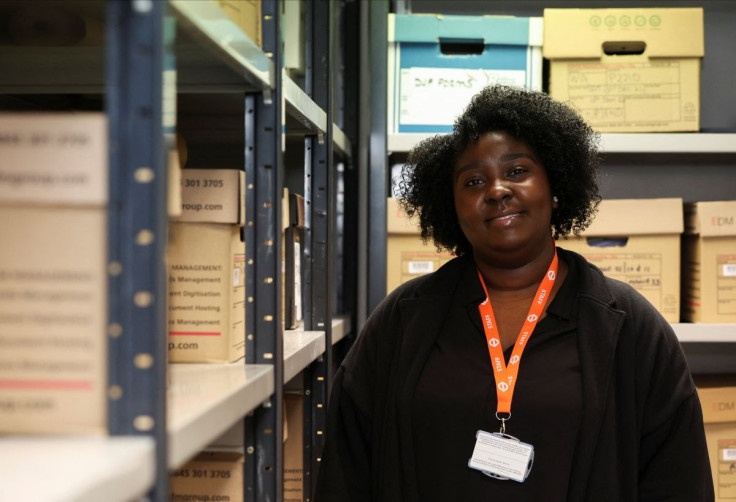Jobs Open Up For Homeless People In UK Labour Market Squeeze

When Zara Asamoah graduated early in the coronavirus pandemic, she had no fixed abode and her chances of finding work looked remote.
Now, thanks to an acute lack of job candidates as Britain's economy reopens and to support from Beam, a crowd-funding charity that helps homeless people into work, Asamoah has a job with a London railway operator and lives in a shared house.
"It's taken a huge pressure off of me " said the 25 year-old, who found it hard to apply for jobs without a stable address, and to get a home without regular income.
Globally, a shortage of people to fill jobs after the pandemic wrought changes to labour markets is worrying central banks who fear wage demands will fuel inflation already at multi-decade highs.
In Britain, the problems are exacerbated by a drop in EU workers after the country left the European Union. Vacancies are the highest on record. As a result, organizations that work with people employers were long wary of, including homeless people as well as other typically marginalised groups such as ex-offenders, say more opportunities are opening up.
Beam estimates interest from employers in its services has tripled since the start of the pandemic. It has ramped up operations to help nearly 30 people a month into jobs so far this year, compared with about 3 a month in 2019, before the pandemic.
While firm numbers of how many homeless people are now being drawn into the workplace are hard to come by, the potential pool of labour is large.
In December, charity Shelter estimated 274,000 people were homeless in England, most of them like Asamoah crashing with friends and family, rather than sleeping rough.
VACANCIES SURGE, WORKFORCE SHRINKS
Britain's ratio of 4.1 vacancies to 100 employee jobs is a record.
During the pandemic many older workers took early retirement and young people opted to stay in education. In late 2021, the share of 16-64 year-olds not in work and not looking for it stood at 21.2%, up from 20.2% in early 2020, government data shows, equivalent to around half a million missing workers.
Sonali Punhani, chief UK economist at Credit Suisse, said the problem was currently even more acute in the United States, where emergency welfare payments have sidelined many workers.
But Brexit meant Britain's recovery would likely be slower.
"Workers will come back over this year but I don't think participation will come back to pre-pandemic levels," Punhani said.
Emily Hocking, head of talent acquisition for buses and trains at Arriva Group, the parent of Arriva Rail London which hired Asamoah, said the situation was "incredibly tough" for employers.
"Brexit, COVID - it's completely changed the landscape," she said.
Faced with candidate shortages that were "not sustainable," Arriva looked for more hires from new sources. After a successful trial between Beam and its London unit, Arriva now plans a national-level partnership.
A WEEK TURNS TO YEARS
As well as the high demand for labour, organizations such as Beam are key to breaking the cycle that keeps homeless people out of work.
Asamoah was first left without a fixed address in 2016 when her mother was evicted over rent arrears. She stayed first with her boyfriend at the time, then a family friend, then her sister, doing only occasional part-time work.
"A week turned into two weeks. Two weeks turned into a month. A month turned into a year," she said. "I realized that we were just not going to get the family home back."
Asamoah stuck to her film-making course at university despite the upheaval. After graduating in 2020, she was struggling again to find somewhere to stay when her local council put her in touch with Beam.
Crowd-funding of just over 3,000 pounds ($3,936) got Asamoah into a shared house a year ago and covered the cost of a laptop and other expenses. Beam coached her on job interviews and introduced her to employers, including Arriva.
Alex Stephany, Beam's founder, said companies could meet the challenge of worker shortages by doing "the right thing for society" and hiring ethically and diversely.
Interventions Alliance, an organisation that helps former offenders find jobs, said it was now much easier to place its clients with a wider range of companies, including transport and hospitality businesses that were previously reluctant.
"There is now much more openness," said Suki Binning, the group's executive director for justice and social care.
For Fox Group, a haulage and construction firm in Blackpool, northwest England, there is potential in nearby Kirkham Prison.
A shift to online shopping in the pandemic made drivers some of the most sought-after workers, compounding the loss of about 4% of Fox's drivers and construction staff after Brexit.
Fox currently employs two former inmates of the prison and seven others who are allowed out to work during the day. In the next few weeks, Fox will open an academy to train and potentially hire 45 inmates as machinery drivers on day release and once they are fully released.
"It's a bit of a no-brainer," director Lee Hardy said. "There are loads of guys out there who want to work and we've got work that we can offer."
(Changes status of Beam to social enterprise from charity)
© Copyright Thomson Reuters {{Year}}. All rights reserved.




















